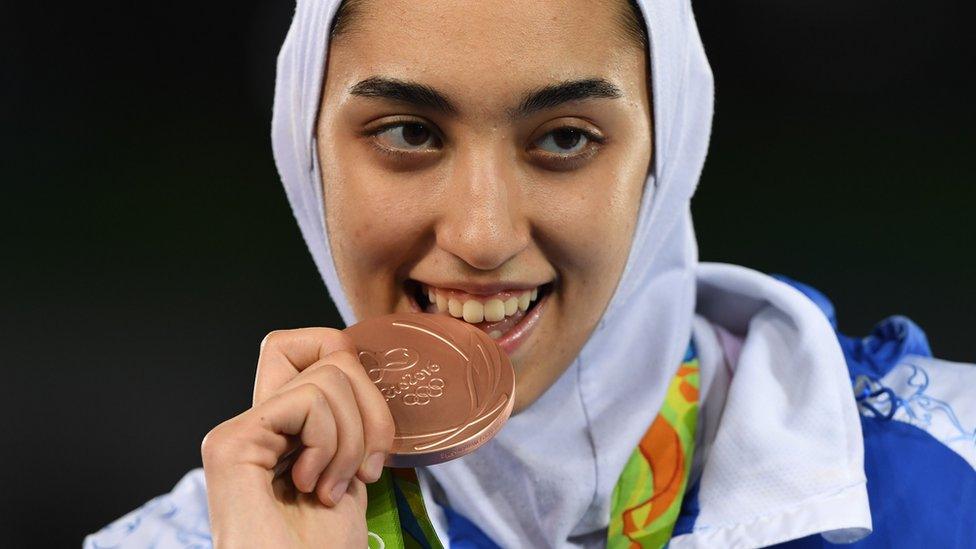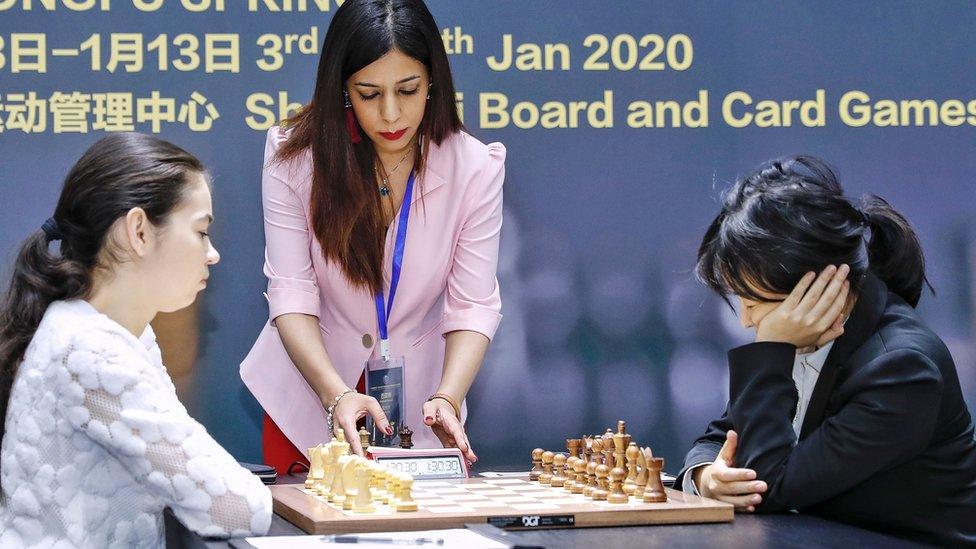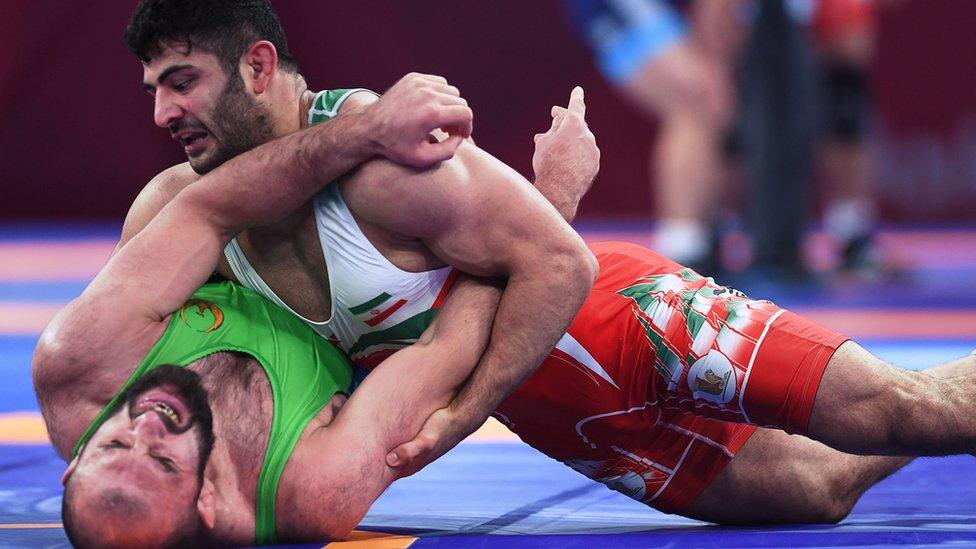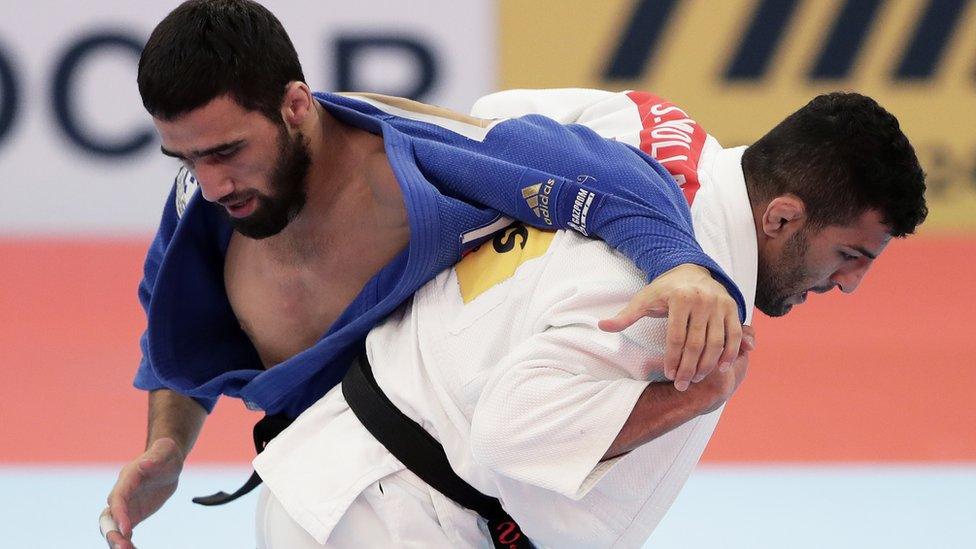Kimia Alizadeh: A guide to Iran's defecting athletes
- Published

Alizadeh felt her success was exploited for propaganda reasons
The announcement by Iran's only female Olympic medallist, Kimia Alizadeh, that she will defect is the latest in a series of high-profile changes of nationality from the country's top athletes.
The defections have been for a variety of reasons and across many different sports. Here are some of the most significant.
Kimia Alizadeh
Alizadeh made history when she competed in taekwondo at the Rio Olympics in 2016.
Aged only 18, she beat Sweden's Nikita Glasnovic 5-1 in the bout for the bronze in the -57kg category. It made her the first Iranian woman to win an Olympic medal.
But in the wake of that success, she felt the country's authorities were using her success as a propaganda tool.
Now 21, she disappeared last week, with rumours circulating she was seeking to settle in the Netherlands.
Though she has not confirmed where she is, she has announced in an Instagram post that she left Iran because she did not want to be part of "hypocrisy, lies, injustice and flattery".
"I wore whatever they told me and repeated whatever they ordered. Every sentence they ordered I repeated. None of us matter for them, we are just tools," she wrote.
She has described herself as "one of the millions of oppressed women in Iran".
Shohreh Bayat, Mitra Hejazipour and Alireza Firouzja

Images of Shohreh Bayat officiating without a hijab caused shockwaves in Iran
As significant as Alizardeh's defection is, it is not even the first major Iranian sporting defection of 2020 - less than two weeks into the year.
Two leading figures in Iranian chess, Shohreh Bayat and Mitra Hejazipour, have both been expelled for removing their hijab in competitions outside of the country. This action is considered defiance of Iran's compulsory Islamic dress code.
Bayat is an international chess referee - Asia's only Grade-A arbiter at that - and previously was the first woman to be general secretary of a sports federation in Iran. She said she would not be returning to Iran after photos were published showing her not wearing the compulsory headscarf during Shanghai Women's World Championship 2020 games.
When the photographs first emerged, Bayat's father said her headscarf had fallen accidentally. But pictures later showed her without it at other games. Nigel Short, the vice-president of the International Chess Federation (Fide), posted one of the photos on Twitter saying Bayat is "a great ambassador for her country", and Bayat retweeted it.
Her father now says she is "worried about going on with her activities in Iran" and is seeking to continue in another country.
Meanwhile on 2 January, the Iran Chess Federation expelled veteran female chess grandmaster Mitra Hejazipour for removing her scarf during the World Rapid and Blitz Chess Championship in Moscow.
Hejazipour, who said she will now compete in a private capacity and live in France, was told she "has no place in the Islamic Republic's national team any more".
Meanwhile at the end of 2019, the world number two junior player, Alireza Firouzja, competed under a Fide flag instead of the Iranian one.
Alireza Karimi-Machiani

Karimi-Machiani has since returned to competition for Iran after his ban ended
For political reasons, Iran has had a blanket ban on any athletes competing against Israeli opposition; Iran does not recognise the state of Israel.
But because this ban violates the rules of most international sporting federations, it has put several athletes in a difficult situation in competitions - in particular sports at which both Iran and Israel have talent, such as wrestling and judo.
For obvious reasons, competition rules generally insist that the athletes themselves cannot select who they compete against.
So competitors, under great pressure from Iranian authorities, have been forced to deliberately lose bouts if winning them would result in facing an Israeli.
This was the case for example with wrestler Alireza Karimi-Machiani, who was dominating against Russian Alikhan Zhabrailov at the U23 World Senior Wrestling Championship in 2017.
Mid-bout, news came through to Karimi-Machiani's coach Hamidreza Jamshidi that another bout had finished and an Israeli would face Karimi-Machiani if he won.
So the coach shouted to Karimi-Machiani that he had to lose.
For this, Karimi-Machiani was banned for six months and Jamshidi for two years.
This prompted the head of Iran's wrestling federation to resign, saying "Forcing an athlete to accept defeat or run around all night looking for a doctor's note is not right."
Saeid Mollaei

Mollaei (right) was ordered to lose against Khalmurzaev - but refused
Saeid Mollaei was the 2018 Judo world champion in the -81kg category. But when defending his title in Tokyo in 2019, he was told to withdraw from his match against Russia's Olympic champion Khasan Khalmurzaev.
It was for familiar reasons - to avoid the prospect of facing an Israeli, in this case Sagi Muki.
But Mollaei refused.
He fought on, eventually losing to Belgium's Matthias Casse in the semi-final (Muki would go on to beat Casse and become the new champion).
Mollaei expressed fears for his and his family's safety after his actions.
"I am a fighter," he said at the time. "I want to compete wherever I can. I live in a country whose law does not permit me to. We have no choice; all athletes must comply with it.
"Even if the authorities of my country told me that I can go back without any problems, I am afraid. I am afraid of what might happen to my family and to myself."
Rather than punish Mollaei - who did not return to Iran, and instead moved to Europe - the International Judo Federation banned Iran from all of its competitions.
The ban remains in place.